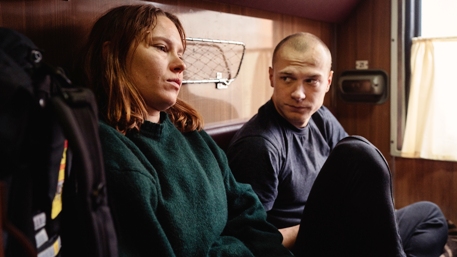 A Finnish woman on a Russian train is aggravated by the man with which she’s forced to share a compartment: an insensitive young tough guy with a chip on his shoulder.
A Finnish woman on a Russian train is aggravated by the man with which she’s forced to share a compartment: an insensitive young tough guy with a chip on his shoulder.
I recently took a trip on Amtrak that included staying in a sleeping car, and although there were practical reasons for this, my inner movie lover also wanted to experience first hand something like the train journeys I’ve loved watching in the movies. From Howard Hawks’s Twentieth Century through more than one Hitchcock film, to Richard Linkater’s Before Sunrise, passenger trains have been a time-honored cinematic tradition. Compartment Number 6, a film from Finnish director Juho Kuosmanen, takes this classic set-up and gives it a refreshingly intimate turn.
We first meet Laura, a young Finnish archaeology student played by Seidi Haarla, at a chic cocktail party in Moscow hosted by a woman we eventually figure out is her lover, a Russian professor named Irina. Laura is about to travel north to the Arctic Circle city of Murmansk to study newly discovered 5000 year-old petroglyphs there, a detail which dates our story to the late 1990s. Laura wants to feel excited about her trip, but she’s sad because Irina has decided not to go with her, so that in addition to feeling out of place in Russia as a Finn with a minimal grasp of the language, she senses that Irina is giving the brush-off to her relationship.
When Laura gets on the train, she’s in for a shock, discovering that she’s sharing the tiny compartment with a young Russian mine worker named Ljoha, played by Yuriy Borisov. He’s a swaggering, almost illiterate tough guy in the process of trying to get as drunk as possible on vodka while filling the little sleeping car with his cigarette smoke. The conversation does not go well. For some reason he thinks she’s Estonian, and makes insulting sexist comments to her. Is she going to have to spend the entire long journey with this creep? She tries to get a different compartment, but the train is full up.
Now, if you’re thinking in conventional terms, you might wonder if the film’s going to make a love story out of this unpromising situation. Thankfully, it doesn’t do that, instead carefully and believably depicting a process by which two people gradually allow themselves to recognize each other for who they really are behind their social masks. The chance of friendship and connection is in this case more meaningful than any kind of romance.
Kuosmanen shot most of the picture on an actual train, with close-ups vividly communicating the cramped atmosphere inside, a confinement that is set against the winter landscape seen rushing by outside the windows. There are also important scenes that are not on the train, including at Murmansk, where the resolution between these two completely opposite characters is achieved with beautiful understatement. Much of the credit for this is due to the two actors, who convey so much more than expected, revealing that their fears of how other people see them have become an obstacle in their lives.
Based on a novel by Finnish author Rosa Liksom, the picture makes fun in a gentle way of the stereotyped differences between Finland and Russia, a subject which is especially interesting in light of current tensions between the two countries. Compartment Number 6 doesn’t take anything for granted, but starts at something like square one in human relations and makes something very surprising and worthwhile out of it.

A romance of 19th century France, in which a famous chef comes to rely on his female assistant to carry out his culinary ideas....

Paul Thomas Anderson pays humorous tribute to the 1970s in southern California in this story of a teenage entrepreneur who falls for a clever...

Jacques Feyder’s 1935 comedy, about the women of a Flemish town disarming an occupying Spanish army with wit and charm, embodies the lost ideals...